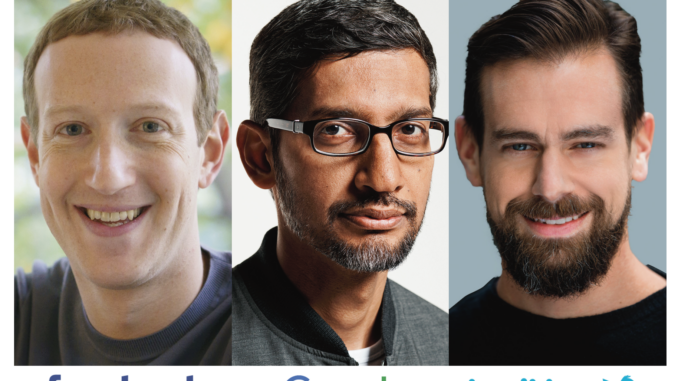
From scrappy startups, operating out of a garage or a dorm room barely 20 years ago, Facebook, Twitter and Google are now among the world’s largest corporations.
They wield enormous power on people and countries, their economy, culture, and speech, even while connecting the world in unprecedented and amazing ways, often for free. They now control an overwhelming cascade of news, information, and videos. They have the power of life and death over the careers of world leaders and politicians and dictate the mood not just of nations, big and small, but indeed, of the world itself. Is that good or bad?
When President Trump tried to claim victory, prematurely, a day after the Nov. 3, 2020 US presidential elections, Facebook, Twitter and Google’s Alphabet were quick to moderate, if not stop, the viral and wrong claims about attempted election theft and posts that encouraged violence. Trump offered no proof to back his claims.
Accordingly, Facebook began adding labels to posts from both the campaigns of Mr. Trump and former Vice President Joe Biden that said votes are still being counted and the winner of the election hasn’t yet been projected.
Twitter applied more stringent standards, hiding some of the claims behind warning labels and restricting the reach of the tweets.
However, the false tweets had begun to circulate even before Facebook and Twitter have taken action. But at least, the tweets went no further.
According to US newspapers, Trump and his allies sent an estimated 9 million text messages between midnight of Nov. 3 and midday of Nov. 4 (Wednesday). Some messages asked for money outright to launch voting challenges.
“Our work isn’t done—we’ll stay vigilant and promote reliable information on Facebook as votes continue to be counted,” said Facebook spokesman Tom Reynolds.
Twitter has been more aggressive than Facebook against content that seems to violate Twitter’s rules. The policy has been scored by conservatives as a Twitter censorship.
A Twitter spokeswoman said the company would continue to flag tweets that contain misinformation about the vote count. “Our teams remain vigilant and will continue working to protect the integrity of the election conversation on Twitter,” said a spokesman for the company.
Google’s YouTube on Tuesday (Nov. 3) morning added labels to all election-related videos and search results. The labels were tagged on livestreamed videos from both candidates that each claimed they believed they were on track to win the election.
The power of Facebook, Twitter and Google to monitor and manage content online came under harsh scrutinty during the US Senate Commerce committee hearing on Oct. 28, 2020. Facebook CEO Mark Zuckerberg testified online. Twitter CEO Jack Dorsey and Alphabet (Google) CEO Sundar Pichai showed up in person.
“They are now among the world’s largest corporations, wielding immense power in our economy, culture and public discourse. Immense power. The applications they have created are connecting the world in unprecedented ways, far beyond what lawmakers could have imagined three decades ago. These companies are controlling the overwhelming flow of news and information that the public can share and access,” Committee Chair Roger Wicker (R-Mississippi) said in his opening statement.
“Both Twitter and Facebook’s aversion to hacked materials has not always been so stringent,” Wicker said, recalling the illegal leaking of Trump’s tax returns (it was not restricted), and the leaking of the Steele dossier, containing allegations of misconduct, conspiracy, and cooperation between Trump’s presidential campaign and Russia during the 2016.
“Google is far more zealous in policing conservative sites than its own YouTube platform for the same types of offensive and outrageous language. It is ironic that when the subject is net neutrality, technology companies including Facebook, Google, and Twitter have warned about the grave threat of blocking or throttling the flow of information on the internet,” Wicker complained.

